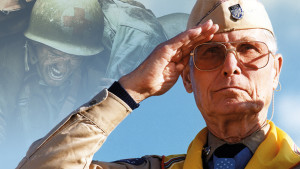Sometimes God leads us to meet unwanted, unlovely or unpopular people, who are simply yearning for a little acceptance and empathy. I count it a privilege that on occasions I've had the opportunity to serve God through some of these “rejects” of society.
I can't claim that all these friends have been converted to Christianity, although some have. But perhaps in some small way even those who haven't become Christians have been influenced positively as I've shared with them my dependence on God and the importance of prayer in my life.
One such “reject” was an old hermit, who initially was just a cultured British voice on the telephone asking for information about diabetes. I'm a government health professional, and such questions are often directed to me. This particular old gentleman called my office often, either to complain about something or to ask a health-related question. Gradually, over the years, I learned a great deal about this bitter old man. He was an unsuccessful artist who'd removed himself from society.
He lived alone in a dilapidated farmhouse about an hour's drive from town, and he'd so alienated himself from society that he had no car, no money, no relatives and no friends. And that's exactly the way he wanted it! His intolerance level was sky high, and he directed it at everything and everyone, especially politicians and bureaucrats. Though I'd never met him, his perpetual complaining fell on my listening ear almost daily via the telephone. Then came a distress call: he could no longer walk the three kilometres to the main road from his farmhouse to pick up supplies, which were dropped by a delivery truck once a week. He wanted to know what he should do.
The time had obviously come when he needed to live in town where deliveries wouldn't be so difficult, so I helped him to obtain a room at a retirement village. As a happily married woman, I had to be careful that no-one misunderstood our strange friendship, so I politely refused to visit him at the retirement village. Instead, I arranged to have lunch with him at a local restaurant next to my office. We met quite often, and he always draped a dark green towel around his neck to wipe away his perspiration. However, he kept himself clean and tidy.
He looked forward so much to these brief meetings and planned everything he would show me down to the last detail. His greatest joy was to read aloud the bizarre poetry he composed.
It was a task trying to understand his prolific rambling. Many strange looks were directed my way as I dined with this unusual hermit.
Gradually he accumulated so many poems that I encouraged him to write a book for publication. I showed him a small book of answered prayers that I had edited to raise funds for our local church building project. That was all he needed to get seriously involved in producing his anthology.
When he asked if he could dedicate it to me, I suggested that he make it an anonymous dedication, and this is what he wrote: “To whomsoever it may concern: These words-of-hazard do proclaim, / a fair proportion of the stir, / which brought about their compass were, / Hustled, bustled into place, by personae of modest grace / Who persistently did push the lame a-wavering, in step unsteady, / On course to get this far and learn, the hugeness of this smallness, / And get it ready. / Though one wonders at the amount of time, / One could spend on every line and rhyme.”
The proposed publication consumed his time, and he kept me informed of everything that was happening, step by step. Gradually, together, we overcame all the obstacles. At last publication day arrived! With great excitement, he told me that he wanted the proceeds from the sale of his book to go to the local hospice, and I had appropriate stickers made. He was thrilled when I managed to sell 22 copies to some of my friends.
Life for him was now so good—he was raising money for charity, and his talent was being appreciated. He was far too busy to whine and complain.
The management of the retirement village required him to give them the name of his next of kin in the event something should happen to him.
However, all of his relatives were from England, and they had all died, so he asked if he could give my name to the retirement village. I agreed. I also found out from a local funeral director the details they needed to know, and I found out his wishes regarding a funeral. Then we forgot all about it and concentrated on selling as many books as possible.
By now he had a vastly changed personality with much increased selfconfidence.
It was wonderful to see this change in him, and I was often able to share my faith in God with him.
One day a policeman arrived at my office and asked to see me. I assumed he had brought a warrant for me to witness in court as a government employee, but instead he told me that my friend had dropped dead at a bus stop on his way home from town. Since I was listed as the next of kin, he asked me to accompany him to the hospital morgue to identify the old man's body.
My friend looked so dignified and stately lying there without his spectacles, shabby hat, and the green towel.
He reminded me of a nobleman in London's Westminster Abbey! His funeral was arranged in accordance with his wishes. Just ten people attended, and that only because I'd personally invited his grocer, pharmacist, and publisher. And to their great credit, they came! The others were from the retirement village.
I wept some tears for my dear friend.
He was a man despised and rejected by the world—as was Jesus—but I was honoured that I could call him my friend.
He'd requested cremation, so one day when the spring wildflowers were in bloom, I took his ashes out to the farm where he'd spent so many lonely years by himself, and the breeze gently blew them across the fields he loved.
My hermit friend taught me much about human nature. I saw in him a truly honest human being. He despised the hypocrisy and falseness of our society.
I also learned much about tolerance— not from him, but because of him. God gave me the ability to accept him as he was, without any pretence or deceit.
I miss him much more than I would ever have thought possible when I first met him over the phone. He was one of Jesus' brothers (see Matthew 25:40), and I can honestly say that I'm grateful for the privilege of knowing him.
I could easily have ignored him, but my life has been so much the richer because of him.
*Diana Smith is a pseudonym




